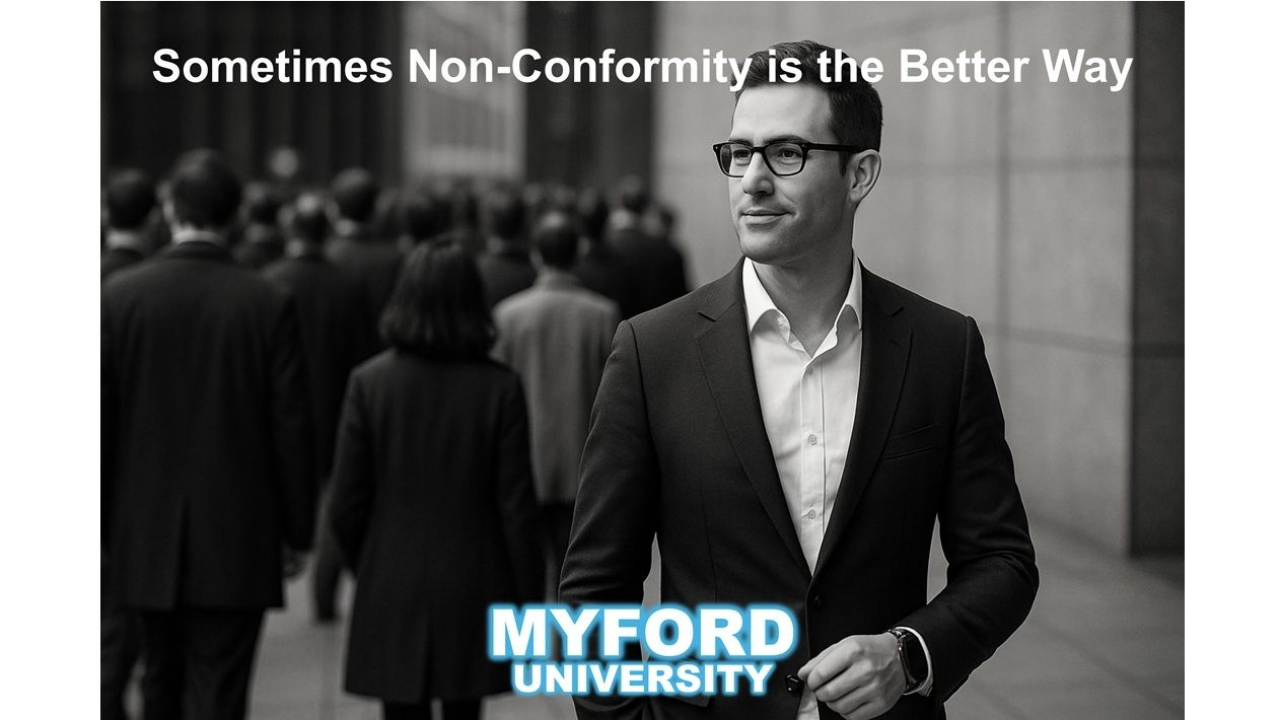Non-Conformity: Sometimes It’s Okay to Be Different
Jul 17, 2025
Let’s start with a truth bomb most people avoid: If you always follow the crowd, don’t be surprised when you end up where the crowd goes. And spoiler alert—these days, that’s usually straight into debt, disillusionment, and dependence.
At Myford University, we’re not here to validate your decisions—we’re here to challenge them. Especially the ones you never questioned in the first place. That includes education, career paths, finances, personal development, and how you measure success. Why? Because the world has changed—but the playbook most people still follow hasn’t.
So today, we’re talking about non-conformity. Not rebellion for the sake of it, not trying to be quirky or “edgy” just to stand out, but choosing your own damn path because it’s smarter, faster, more aligned, and more future-proof than what everyone else is doing.
Let’s get clear: sometimes it’s okay to be different. In fact, sometimes it’s the only intelligent choice left.
The Myth of the Middle
We’ve all heard it:
- Go to a good school.
- Get a safe degree.
- Work a “stable” job.
- Climb the ladder.
- Retire at 65 if you're lucky.
That’s not a strategy. That’s a formula for mediocrity.
This isn't to shame anyone who chose that path. For a long time, it was the best option. But times change—and your thinking needs to change with it.
We live in a world of rapid disruption: AI is eating jobs. Information is free. Skills are more valuable than credentials. The market rewards adaptability, not pedigree. And yet? Most people are still paying six figures for a college degree they could replace with $2,000 and a few weekends of focused self-education.
The Problem With Conformity
Let’s be clear: some conformity is good. We conform to hygiene standards, stop at red lights, and (hopefully) treat each other with basic respect. That’s not the kind of conformity we’re talking about.
We’re talking about the kind of conformity that dulls your edges, kills your ambition, and locks you into a system that no longer serves you.
Here’s what conformity often looks like today:
- Going to college because “you’re supposed to.”
- Taking on debt because “everyone does.”
- Choosing a major because “it sounds smart.”
- Staying in a job because “it’s safe.”
- Following routines that make you miserable because “that’s life.”
It’s not just outdated—it’s dangerous. Because it trains you to silence your own instincts. To ignore the obvious. To go along just to get along.
That’s not strategy. That’s sleepwalking.
Why Being Different Pays Off
Let’s flip the narrative.
In today’s world, being a smart non-conformist is often the most logical thing you can do. Here’s why:
- Markets Reward Differentiation
You don’t get noticed by being the same. Whether you’re selling a product, applying for a job, or pitching yourself as a consultant, you stand out when you offer something different—a new approach, a fresh solution, a unique perspective. That applies to your education too. Self-educating, building a portfolio, or launching a micro-business gets attention in a way a generic degree no longer does.
- The Crowd is Often Late
By the time something becomes mainstream, the opportunity is usually gone. The innovators and early adopters have already cashed in. Waiting for mass approval is a losing strategy. Being different lets you see the trends early and move fast—before the rest of the world catches on.
- Non-Conformity Builds Real Confidence
When you do something different and make it work, you build earned confidence. You’re not bluffing. You’ve walked the road less traveled and survived. You become someone who trusts their judgment—and that’s powerful.
- You Gain Autonomy
Conforming often means ceding control—over your time, your money, your path. Choosing to be different puts you in the driver’s seat. You pick the route, the vehicle, the destination.
What It Means to Be a Smart Non-Conformist
Let’s clarify something: being different isn’t the goal. Being smart is.
This isn’t about being weird for attention. This is about making intelligent, strategic choices that diverge from the norm because the norm isn’t working anymore.
Smart non-conformity means:
- Questioning assumptions.
- Challenging tradition when it no longer serves.
- Refusing to blindly follow outdated rules.
- Building your own playbook based on data, logic, results, and values.
That’s the Myford University way.
How to Know When to Be Different
Not every situation calls for disruption. So when should you go against the grain?
Here’s a helpful framework—The 5 W’s of Smart Non-Conformity:
- What Should You Challenge?
Ask: What parts of “the way it’s done” make no logical sense?
If the standard path:
- Costs too much
- Takes too long
- Delivers poor results
- Lacks adaptability
- Fails to prepare you for what’s coming
…it’s time to challenge it.
Example: Traditional higher education. You don’t need a $200K degree to start a business, get a promotion, or break into tech. You need skills, a portfolio, and proof you can execute.
- Why Should You Challenge It?
Because you’re not average—and you don’t want average outcomes.
Most people don’t get ahead by being compliant. They get ahead by thinking critically, spotting inefficiencies, and moving differently.
Example: The person who skips college, starts a service business at 18, and makes six figures by 22. That person didn’t follow the herd. And they’re way ahead of it.
- When Should You Be Different?
When:
- The system is broken.
- The path is saturated.
- The ROI (Return on Investment) doesn’t make sense.
- You feel in your gut something isn’t right.
Being early is lonely—but profitable. Being late is comfortable—but expensive.
- Where Should You Be Different?
Focus on high-leverage areas:
- Education
- Career strategy
- Business models
- Skill acquisition
- Time use
- Problem solving
You don’t need to be a rebel in everything. Pick your spots wisely. Challenge what matters most.
- Who Will Push Back?
Be ready for resistance. Most people fear what they don’t understand—and that includes your decisions.
- Your parents might not get it.
- Your friends might tease you.
- Your colleagues might question your choices.
Ignore them. They’re often just afraid you’ll succeed and prove their path was optional all along.
Who You’re Really Up Against
Being a smart non-conformist means fighting two battles:
- The External Critics
People will say:
- “That’s risky.”
- “You’re being unrealistic.”
- “Why don’t you just do it the normal way?”
Their fear isn’t about you—it’s about them. If you succeed, they’re forced to reevaluate their own choices. That’s uncomfortable.
Solution: Let your results speak. Don’t argue. Just win.
- The Internal Doubts
Sometimes the loudest voice of resistance is your own. That voice that says:
- “What if I fail?”
- “What if they’re right?”
- “What if I’m not good enough?”
That’s fear, not fact. And the only way to quiet it is through action.
Build something. Try something. Prove to yourself that different works.
How to Practice Strategic Non-Conformity
Let’s get practical. If you’re going to break away from the herd, you need tools. Here are six ways to start living a smarter, non-conformist life today:
- Audit Your Current Conformities
Where are you following along without thinking? List them.
- Are you in college for a reason or just because?
- Are you working a job that’s “safe” but draining?
- Are you following routines that don’t serve your goals?
Identify, then challenge.
- Define Your End Game
Most people drift because they don’t know where they’re going.
Figure out:
- What do you want?
- Why do you want it?
- What’s the best path to get there?
Odds are, it won’t be the same path everyone else is on.
- Build Skills, Not Just Status
Degrees are status. Skills are leverage.
Invest in learning that creates options:
- Learn sales, copywriting, coding, data, design.
- Learn how to manage projects, lead teams, or build systems.
- Learn how to create value.
That’s the true currency of the future.
- Document Your Value
Instead of saying “I know X,” show it:
- Build a portfolio.
- Write case studies.
- Create a demo.
- Record a video walkthrough.
Proof beats promises. Every time.
- Find Allies
You’re not alone. There’s a growing tribe of people who are opting out of the system.
Find them:
- Online communities
- Learning platforms
- Mastermind groups
- Freelance circles
- Entrepreneurship forums
Get around people who get it. It makes the journey easier.
- Stack Small Wins
Start small. Test ideas. Launch experiments. Get feedback.
- Try a side hustle.
- Build a sample project.
- Take a course that builds ROI-ready skills.
- Create a 30-day challenge.
Non-conformity doesn’t have to be reckless. It can be strategic, measured, and repeatable.
Final Thought: The Courage to Be Different
Here’s the uncomfortable truth most won’t say out loud:
Being average is more dangerous than being bold.
Following the safe path—college, debt, wait-your-turn careers—isn’t actually safe anymore. It’s slow, expensive, and increasingly obsolete.
The new safety? Is in speed, adaptability, and skill. And to get that, you have to be willing to do things differently.
Being a smart non-conformist isn’t about rebellion—it’s about logic, results, and freedom.
At Myford University, we’ll say it plainly:
You don’t need to ask permission to live life on your terms.
You just need the courage to think for yourself, the clarity to act with purpose, and the commitment to keep going—even when others don’t get it yet.
If that sounds like you, welcome home.
You’re not weird. You’re early.
And you’re exactly where you need to be.
Stay connected with news and updates!
Join our mailing list to receive the latest news and updates from our team.
Don't worry, your information will not be shared.
We hate SPAM. We will never sell your information, for any reason.

